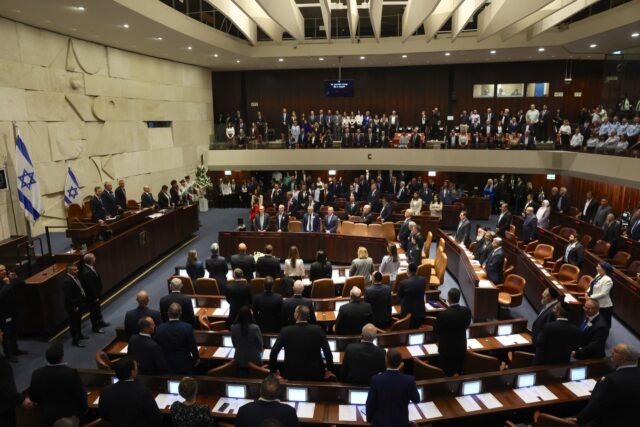Israel’s Netanyahu-led government passed the first of three readings of a bill in the contentious judicial reform plan overnight on Tuesday, granting the ruling coalition more control over the appointment of judges.
Sixty-three Knesset members voted in favor and 47 voted against, with no abstentions, but some lawmakers boycotted the vote.
If the bill passes all three readings, elected officials, and not an independent and private committee, will be approve the appointment of justices.
The vote occurred amid roiling protests across the country, with protesters even breaking into the Knesset and the plenum.
Protesters on Monday blocked the homes of several members of Knesset, including that of Religious Zionism MK Simcha Rothman, a chief proponent of the reform, as well as the home of Likud MK Tali Gottlieb, whose autistic daughter was barred from leaving.
Opposition leader Yair Lapid (Yesh Atid) slammed the coalition, saying “history will judge you for tonight.”
“For the damage to democracy, for the damage to the economy, for the damage to security, for tearing apart the nation of Israel and for not caring,” said Lapid.

A protestor waves Israeli flags during a demonstration against judicial reforms held in Jerusalem and Tel Aviv, while Israeli lawmakers were set to vote in a first reading on the debated judicial reform in the Knesset. (Eyal Warshavsky/SOPA Images/LightRocket via Getty Images)
MK Simcha Rothman, chair of the Constitution, Law and Justice Committee and a key architect of the reform along with Justice Minister Yariv Levin, said that now that the bill had passed its first reading, the coalition was ready to engage in “dialogue” over the reform mediated by President Isaac Herzog with the opposition.
But opposition member MK Benny Gantz vowed not to join in any discussions given the circumstances.
“Passing its first reading is putting a bullet in the chamber and cocking the gun, and I won’t negotiate under such circumstances,” Gantz said.
Herzog, for his part, said there was a feeling of sorrow in the air.
“This is a very difficult morning; there is a feeling of sorrow, there is no feeling of celebration. There is a feeling of sadness because many citizens from all parts of Israeli society, [including] many people who voted for this coalition… are anxious about the unity of the nation,” Herzog said.
Responding to his words, Rothman told Army Radio: “This is not a morning of sorrow. It’s a morning in which a huge part of the people… has erupted in roars of joy.”
“Yes, sometimes the joy of one person can create sorrow in another, certainly in a political disagreement,” he said.
“After 30 years of judicial dictatorship, the State of Israel is on the path to democracy,” he added.
“You will not hear a different approach from me, as I have been open to talks since day one,” Rothman said, and added that he had no plans to heed the opposition’s call to suspend the legislative process.
In demanding preconditions for talks, the opposition is “behaving as though it won the elections,” he said.
Many in Netanyahu’s ruling coalition believe the judicial reform proposals would correct a power grab by the Supreme Court and restore a balance of power to the executive branch. Apart from the appointment of justices, the proposals, presented early last month by Justice Minister Yariv Levin, also call for cancelling the so-called “reasonableness measure” by which the Supreme Court can strike down any law or government action it deems “unreasonable.”
For example, the court ruled it “unreasonable” to allow religious Jews to pray on the Temple Mount – Judaism’s holiest site – because doing so would anger the Arab world.
The reform would also see an amendment to the so-called override clause, enabling the Knesset to re-legislate laws that the Supreme Court had struck down, pending a 61-MK majority.

COMMENTS
Please let us know if you're having issues with commenting.